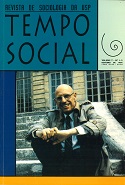The subject in Foucault: aesthetics of existence or moral experiment?
DOI:
https://doi.org/10.1590/ts.v7i1/2.85213Keywords:
Foucault, Subject, Aesthetics of existence, Sexual practices and roles, Homossexualism, Sado-masochismAbstract
The article discusses the objections taken to Foucault´s ideas about the subject´s ethics which would lead to an absence of compromise with universal values and principles of the liberal democracies. Discussing Taylor´s, Hochlitz´s, Hadot´s and Rorty´s propositions Foucault´s answer would be formulated based on a radical change in the subject´s image and in the ways of building up relations which, in case of sexuality, as the categories are re-defined, would question the actual moral hierarchy of sexual practices with his fixed domination and subjection relationships.Downloads
References
BERTEN, André. (1994) Sur la distinction du public et du prive. Entre lês libéraux et communautariens. In: RORTY, Richard. Ambiguïtés et limites du postmodernisme. Organizado por G. Hottois e M. Weyenbergh. Paris, Vrin. p. 185-205.
DAVIDSON, Donald. (1982) Paradoxes of irrationality. In: WOLHEIM, Richard & HOPKINS, James (eds.). Philosophical essays on Freud. Cambridge, Cambridge University Press. p. 289-305.
DAVIDSON, Donald. (1990) The structure and content of truth. The Journal of Philosophy, Vol. LXXXVIII, n° 6, June: p. 279-328.
DAVIDSON, Donald. (1991a) A Coherence Theory of Truth and Knowledge In: MALCHOWSKY, Alan (ed.). Reading Rorty. Oxford, Basil Blackwell. p. 120-139.
DAVIDSON, Donald. (1991b) Inquiries into truth & interpretation. Oxford, Oxford University Press.
ENGEL, Pascal. (1994) Davidson et la philosophie du langage. Paris, PUF.
EVNINE, Simon. (1991) Donald Davidson. Stanford, Stanford University Press.
FOUCAULT, Michel. (1994a) Dits et écrits - 1954-1988. Vol. III, 1976-1979. Paris, Gallimard.
FOUCAULT, Michel. (1994b) Dits et écrits - 1954-1988. Vol. IV, 1980-1988. Paris, Gallimard.
FRASER, Nancy. (1990) Solidarity or singularity? Richard Rorty between romanticism and technocracy. In: MALCHOWSKY, Alan (ed.). Reading Rorty. Oxford, Basil Blackwell. p. 303-322.
HADOT, Pierre. (1989) Refléxions sur la notion de “culture de soi”. In: Michel Foucault -Philosophe. Paris, Seuil. p. 261-269.
HALL, David L. (1994) Richard Rorty - Prophet and poet of the new pragmatism. New York, State University of New York Press.
MURPHY, John P. (1990) Pragmatism - From Peirce to Davidson. Boulder/San Francisco/Oxford, Westview Press.
ROCHLITZ, Rainer. (1989) Esthétique de l’existence. In: Michel Foucault - Philosophe, Paris, Seuil. p.288-300.
RAMBERG, Bjorn. (1989) Donald Davidson's philosophy of language. Oxford, Basil Blackwell.
RORTY, Richard. (1989) Contingency, irony, and solidarity. Cambridge, Cambridge University Press.
RORTY, Richard. (1991a) Objectivity, relativism, and truth - philosophical papers. Vol. 1. Cambridge, Cambridge University Press.
RORTY, Richard. (1991b) Essays on Heidegger and others - philosophical papers. Vol. 2. Cambridge, Cambridge University Press.
RORTY, Richard. (1992) Réponse à Alexander Nehamas. In: BOUVERESSE, Jacques. Lire Rorty - Le pragmatisme et ses conséquences. Paris, l’Éclat. p. 213-223.
RORTY, Richard. (1994) L'espoir au lieu du savoir. Paris.
TAYLOR, Charles. (1989) Foucault, la liberté, la vérité, In: Michel Foucault - Lectures critiques. Bruxelles, Éditions Universitaires. p. 85-121.
VISKER, Rudi. (1994) Garder l’être. Entre ironie et finitude, In: RORTY, Richard. Ambiguïtés et limites du postmodernisme. Organizado por G. Hottois e M. Weyenbergh. Paris, Vrin. p. 275-297.
Downloads
Published
Issue
Section
License
Copyright (c) 1995 Tempo Social

This work is licensed under a Creative Commons Attribution-NonCommercial 4.0 International License.


